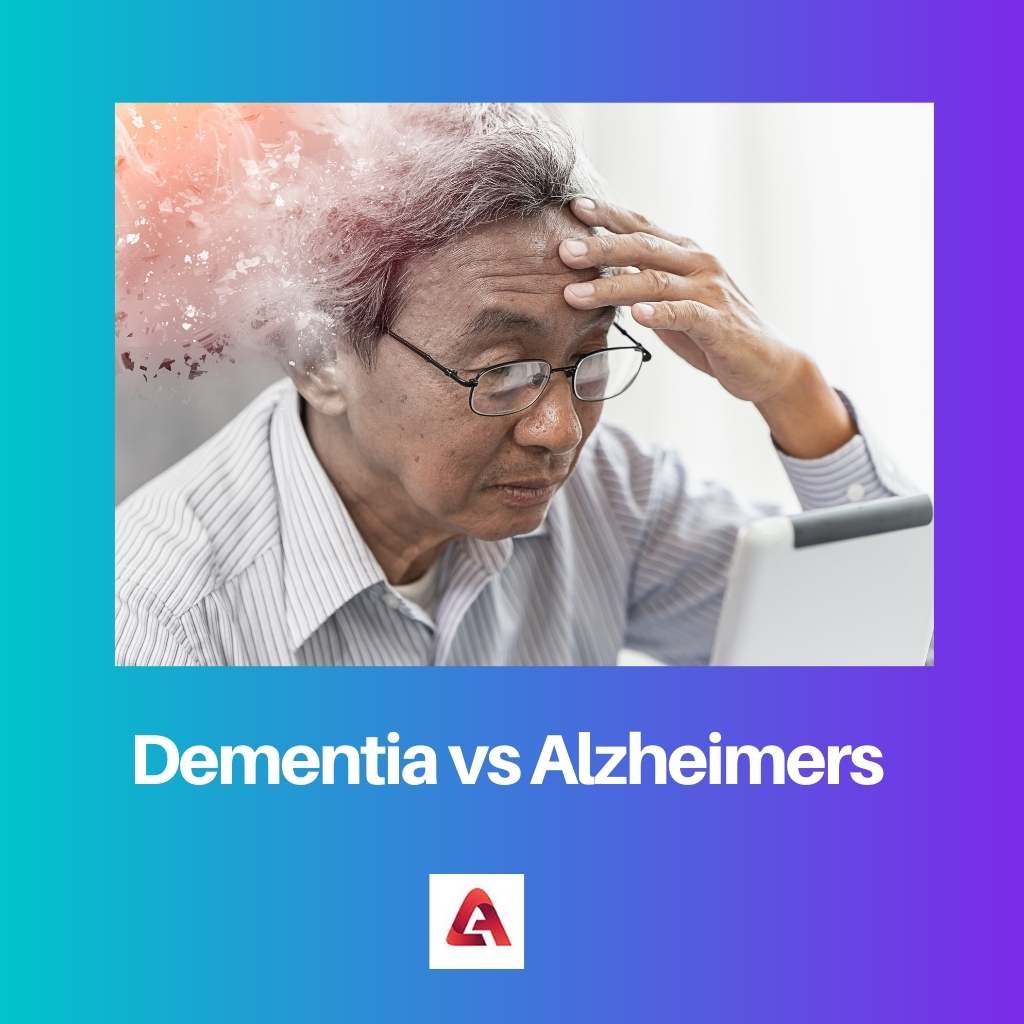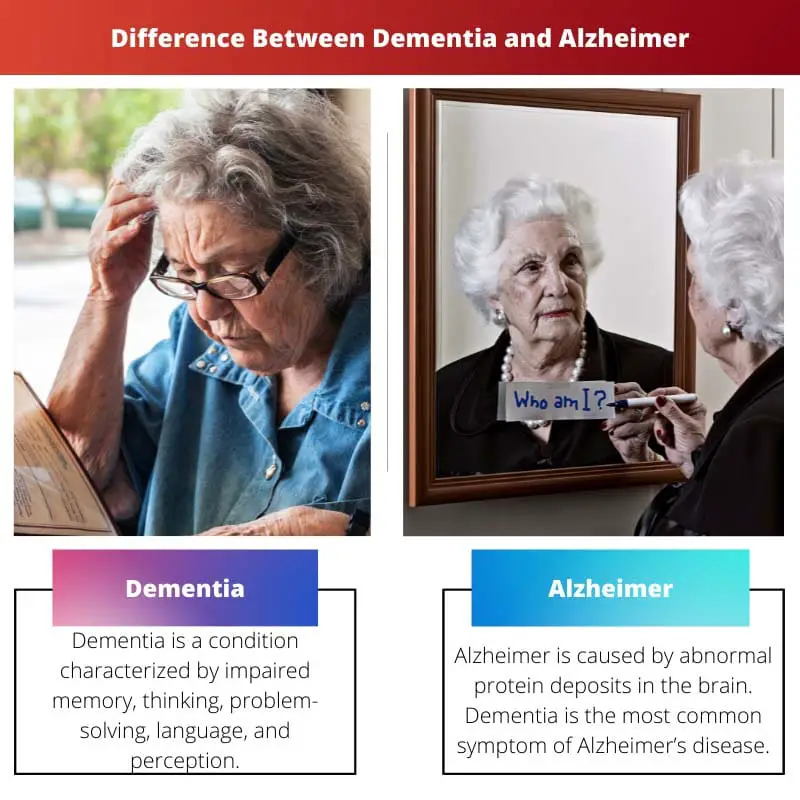Certain medical terms can be difficult for non-medical people to comprehend. Any disease or syndrome can be diagnosed using a variety of specific factors and indicators.
Dementia and Alzheimer’s disease will be discussed here. Even though they are two distinct terms, most of us confuse them. Let’s look at the main differences between the two.
Key Takeaways
- Dementia is an umbrella term for cognitive decline, while Alzheimer’s is the most common type of dementia.
- Alzheimer’s is a specific brain disease, whereas dementia can have various causes and symptoms.
- Dementia symptoms can sometimes be reversible, but Alzheimer’s is a progressive and irreversible condition.
Dementia vs Alzheimer’s
Dementia is a decline in cognitive function caused by underlying conditions and can cause memory loss, difficulty with language, impaired judgment, personality changes, and confusion. Alzheimer’s disease is a progressive brain disorder that causes memory loss and other cognitive problems.

Dementia is a condition characterized by impaired memory, thinking, problem-solving, language, and perception. Dementia appears to be the result of a person’s difficulties in these areas.
Dementia is a condition that can develop as a result of certain diseases rather than a disease in and of itself. Alzheimer’s disease is the most common. It should also be noted that dementia is not a natural part of the ageing process.
Alzheimer’s, on the other hand, is caused by abnormal protein deposits in the brain. Dementia is the most common symptom of Alzheimer’s disease.
Plaques and tangles are abnormal substances that are made up of two primary proteins: amyloid and tau. A person develops the disease as a result of the abnormal function of these two proteins.
Comparison Table
| Parameters of comparison | Dementia | Alzheimers |
|---|---|---|
| What exactly is it? | Syndrome | Disease |
| Caused due to | Caused by heavy depression, Alzheimer’s disease, and other factors. | Protein that functions abnormally and is deposited abnormally in the brain.Symptom |
| Symptom | Loss of concentration, difficulty organizing, visual perception and language difficulties, and so on. | Swallowing, apathy, and other behavioral changes |
| Is the hippocampus initially affected? | No | Yes |
| Which stage of life is more prone to experience it? | Regardless of your age | The majority of the people are elderly. |
What is Dementia?
Dementia is a collection of symptoms that can be caused by a variety of factors. Alzheimer’s disease is one of the leading causes.
Loss of concentration, difficulty organizing, visual perception, language difficulties, and other symptoms are common in people suffering from dementia.
Dementia is a generic or umbrella term that includes Alzheimer’s disease as one of its causes. Mixed dementia is a term that refers to a variety of dementias.
An autopsy can be used to confirm the condition. Dementia is a progressive disease, meaning that it gets worse over time.
The condition makes it difficult to function independently, and according to a WHO study, 47.5 million people are affected by dementia.
The early stages of dementia are characterized by a lack of prominent symptoms that are mild and easily overlooked. Otherwise, the patient’s memory begins to deteriorate over time.
It also caused a lot of confusion, making remembering people’s names and faces difficult. The damage to brain cells causes dementia.
Apart from Alzheimer’s disease, dementia is caused by Parkinson’s and Huntington’s diseases. Aside from vascular diseases, dementia can also be caused by stroke, depression, and other factors.
Though dementia is not curable, medications can help keep the condition under control.

What is Alzheimer’s?
Alzheimer’s disease, on the other hand, is a disease that can be detected if a person has memory loss or other cognitive issues. Though the primary cause of the disease is unknown, it is linked to the degeneration of nerve cells.
Alzheimer’s disease affects the hippocampus region of the brain first. This causes the person to forget recent events, but childhood memories can still be recalled.
Because the hippocampus stores recent events, Alzheimer’s disease affects thinking and memory in this way.
Alzheimer’s disease does not strike suddenly; it develops gradually over time, long before you realize you are suffering from it.
The brain begins to decline after the links or connections between cells are broken, and the cells die.
The brain shrinks as a result of this. When the person is alive and in his senses, an autopsy under a microscope can be used to diagnose the disease.
Apathy, inability to recall recent events, disorientation, changes in behaviour, and confusion are some of the symptoms of Alzheimer’s disease.
Although there is no cure for the disease, certain medications can help with the various symptoms. Alzheimer’s disease is classified as a terminal illness with no known cure.
The disease is divided into three stages. According to observation, a person with the disease can only live for four to eight years after being diagnosed.

Main Differences Between Dementia and Alzheimers
- Dementia is a syndrome, whereas Alzheimer’s is a disease.
- Heavy depression, Alzheimer’s disease, and other factors cause dementia, whereas Alzheimer’s disease is caused by a protein that functions abnormally and deposits abnormally in the brain.
- Dementia symptoms include loss of concentration, difficulty organizing, visual perception and language difficulties, and so on, whereas Alzheimer’s symptoms include swallowing, apathy, and other behavioural changes.
- The hippocampus is not always affected first in dementia but first in Alzheimer’s disease.
- Dementia can affect people of any age, whereas Alzheimer’s disease is mostly seen in the elderly.

- https://www.sciencedirect.com/science/article/pii/S1064748112610562
- https://psycnet.apa.org/record/1993-30203-001
Last Updated : 13 July, 2023

Sandeep Bhandari holds a Bachelor of Engineering in Computers from Thapar University (2006). He has 20 years of experience in the technology field. He has a keen interest in various technical fields, including database systems, computer networks, and programming. You can read more about him on his bio page.

The article is well-organized and filled with facts, but I think it should mention that there can be multiple types of dementia, not just Alzheimer’s.
A very informative article, it can be difficult to understand the differences between these two illnesses. Indeed, when hearing the word Dementia, it’s common to think about Alzheimer’s disease and vice versa.
Dementia and Alzheimer’s disease are very difficult to diagnose, mainly because they share similar symptoms. This article gives clear and concise differences between the two. Good job.
Interesting how the article mentions that dementia is not curable; however, Alzheimer’s also has no cure. Are there any other options to help manage and slow down the progression of the diseases?
Alzheimer’s disease is indeed one of the most severe forms of dementia, the difference is evident, but I think it would be beneficial to further expand about the symptoms and differences between these two diseases.
The article is informative, but it would be beneficial for readers if more research studies were added such as studies from reliable sources.